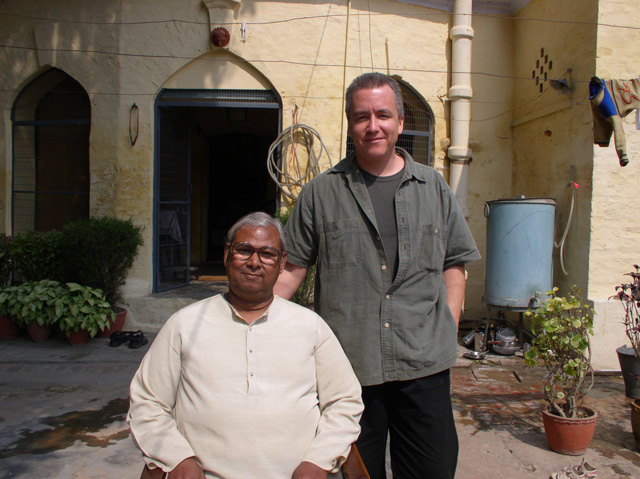Matthew Rosen

With Chhotelal Misra at His Home, 2003
My connection to the tabla began way back in 1985. While studying as an undergraduate at the University of Wisconsin (my home state in the U.S.), I had the good fortune of going on a college-year-abroad program to Nepal. At the time, I knew nothing about the tabla or Indian music, but decided to take some tabla lessons as an elective course for the program.
My first tabla teacher was Sambu Prasad Misra, a Benares tabla player whose family had emigrated to Nepal. Later that year, I studied with the Hom Nath Updyaya, a Nepali disciple of Ramji Misra (son of Anokhelal Misra) and an occasional student of Chhotelal Misra. Both of these players, unfortunately, have since passed away.
Through Hom Nath, I was introduced to Chhotelal while he was in Nepal in 1986. He encouraged me to come to Benares and so, in late 1986, I boarded a bus from Kathmandu to Benares and began studying in earnest with Chhotelal. I continued studying with him—on and off with some long gaps—until his death in 2013.
Like many who discover the tabla, I became hooked soon after I began studying. But I have never wanted to become a performer of classical Indian music. Rather, I am simply an amateur tabla player in the true sense of the word: “one who loves”.
Over the years, tabla has become a kind of meditative practice for me, and I have rarely gone a day without playing since I began.
Aside from tabla, I played and studied bass guitar for some years in my teens and twenties, and have dabbled in conga and bongos in the Afro-Cuban tradition.
After rhythm, my second great love is language. I have a master’s degree in Applied Linguistics and taught English professionally for more than 10 years around the globe. I’m fluent in Spanish and Hindi.
More recently, I am focusing on digital writing and publishing, primarily for education as you’ll find here on the website.
I mention all this because my background might give me some advantages in explaining a tradition which is remarkably foreign to the West—as well as to many Indians—and which embodies both drumming and spoken language.
But classical tabla is a virtuosos’ tradition. And the only true authorities are the masters themselves. So as much as possible, I defer to what the masters have written, said to me personally, or do in their performances.
I have also learned much from other writers and their research. These works are mentioned in the Bibliography, and on any pages where they were referenced.
I welcome any comments and suggestions for the site. One of the advantages of a website is that edits can be made instantly, and I expect DigiTabla will be in a constant state of updating.